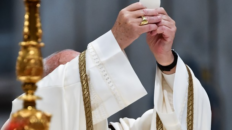The Power of the Church
During His life on earth the Saviour sent forth His apostles and disciples “ and gave them power and authority over all devils, and to cure diseases.” The disciples returned from their first mission, filled with joy, and said: “ Lord, the devils also are subject to us in Thy Name.” But Jesus answered them: “ Behold, I have given you power to tread upon serpents and scorpions, and upon all the power of the enemy and nothing shall hurt you . . . But in the same hour Jesus rejoiced in the Holy Ghost, and said: „ I confess to Thee, O Father, Lord of Heaven and earth, because Thou hast hidden these things from the wise and prudent and hast revealed them to the little ones. Yea, Father, for so it hath seemed good in Thy sight” (Luke X).
Thus the Saviour, while He was still on earth, allowed His disciples to share, to some extent, in His divine power of bestowing grace. But when He took leave of the world He gave them His full power to save and to heal: “As the Father has sent Me, so I send you.”
This is the great divine authorisation of the Catholic priesthood. Our Lord‟s work as Redeemer is to be continued in the world, and to this end His priests are endowed with the power which the Redeemer Himself received from His Father. Even as Jesus healed, the Catholic priest shall and can heal, save and bless. In the Name of Jesus, the priest shall and can break the power of evil spirits, that they may not harm us. He shall and can place us under the protection and blessing of God in all places and in all conditions of life. The Catholic church has received from her divine Founder the power, through her servants, the priests, of penetrating the whole human existence with divine inspiration and grace. We have the surest foundation for believing this.
The apostles and their immediate successors and assistants, by numerous miracles, soon revealed that God was with them, that through them He bestowed His blessing on men of good will. In the days of the miracle of Pentecost it was clear that Peter shared His divine Master‟s power of healing. In the Acts of the Apostles we are told that Peter met a cripple at the Golden gate who asked him for an alms. Peter said to him: “Silver and gold have I none, but what I have, I give thee:
In the Name of Jesus Christ of Nazareth, arise, and walk.‟ And, taking him by the right hand, he lifted him up and forthwith his feet and soles received strength. And he leaping up, stood, and walked, and went in with them into the temple.” (Act III).
A few pages farther on we find, in the same book, frequent instances of such miracles, the apostles being mediators of the divine aid and divine grace: “By the hands of the apostles were many signs and wonders wrought among the people . .. . They brought forth the sick into the streets, and laid them on beds and couches that, when Peter came, his shadow, at the least, might overshadow any of them, and they might be delivered of their infirmities.
And there came also together to Jerusalem a multitude out of the neighbouring cities, bringing sick persons, and such as were troubled with unclean spirits; who were all healed.” (Acts V). And the following particular instance is related of St. Paul, the great apostle of the Gentiles: “And God wrought by the hand of Paul more than common miracles.
So that there were even brought from his body to the sick, handkerchiefs and aprons, and the diseases departed from them, and the wicked spirits went out of them” (Acts xix). Thus we see that even the shadow, handkerchiefs and aprons of the apostles were mediators of divine assistance.
But it was not the actual vocation of the apostles and their successors, the Catholic priests, to perform miracles and heal the human body. They were called rather to save souls, to make men holy, to bring them nearer to God and unite them to Him for all Eternity. This distinction is very important.
The astonishing visible miracles which they worked were and should be no more than the divine testimony and sign of the much greater supernatural power of healing souls with which the servants of Christ are endowed. In what does this supernatural power consist? They offer the most holy sacrifice, and renew by this unbloody sacrifice, the redemption of the world by Christ at Golgotha.
Infinite grace comes from the sacrifice on the altar where the Catholic priest in intercession elevates the immaculate Lamb of God. By administering the seven Sacraments he introduces souls into a wonderful world of grace. By holy Baptism man is born again, a child of God; the Sacrament of Confirmation seals his affiliation with God; the most Blessed Eucharist is his daily bread; the Sacrament of Penance renews or strengthens his affiliation with God;
Marriage consecrates the family of God‟s children; by Extreme Unction they are blessed at the hour of death; by Holy Orders the children of God are raised to be administrators of the means of sanctification instituted by the Son of God. How wonderful are the gifts which the Catholic Church is empowered to bestow, through her priests!
Yet her power of imparting grace is not here exhausted. Between the principal stations of our life which are sanctified by the Sacraments numerous small, but none the less important concerns enter our lives daily, hourly, which can not well dispense with God‟s blessing.
For these concerns the Catholic Church offers us her sacramentals, that is, exorcisms, consecrations, blessings, through which all that is harmful, especially the influence of the evil spirits, is warded off from us, and all that may help us rendered good and beneficial. To this end the Church uses the power bestowed upon her by Christ and follows the example He gave when He laid His hands on the little children and blessed them; when, looking up to Heaven, He blessed the loaves and fishes for the hungry multitudes.
In the same way the Catholic Church blesses mothers and children, food and drink, dwellings, clothing, pasture and corn, domestic animals, barns, stables, workshops, machines and innumerable other things. She consecrates her churches and all that is intended for God‟s service; she consecrates cemeteries and blesses the graves of our dear ones, oil, candles, herbs, palms, crucifixes, rosaries, scapulars, medals, and especially holy water for the manifold, pious use of body and soul.
The Catholic Church possesses enormous power of imparting grace; she surrounds her faithful children with innumerable spiritual helps and the divine protection. If but few receive these abundant graces, the cause lies in the want of a lively faith—a want from which our time suffers so much.
That which was said of the inhabitants of Nazareth is only too true today: “Because of their little faith Jesus did not work many miracles.” Thus, because many are weak, cold and ungenerous in their faith, God cannot expend on them his supernatural graces, even through His priests.
We read in the Gospel that the Saviour has always demanded a lively faith as a condition for His miraculous aid. The best prayer of petition is a lively, childlike faith.
Therefore let us increase our faith by making frequent acts of faith and by a life of strong faith. Let us look upon all the things of religion with believing eyes, and let us use them with pious zeal and a holy desire for divine aid. In this way also we should look upon holy water which is the source of abundant graces.




Add comment